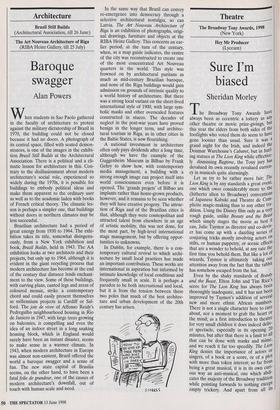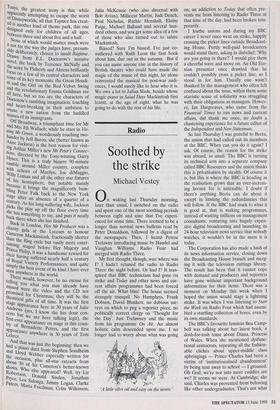Theatre
The Broadway Tony Awards, 1998 (New York)
Hey Mr Producer (Lyceum)
Sure I'm biased
Sheridan Morley
The Broadway Tony Awards have always been as eccentric a lottery as any other theatre or movie prize-givings, but this year the elders from both sides of the footlights who voted them do seem to have gone loonier than usual. Sure it was a grand night for the Irish, and indeed the Donmar Warehouse's Cabaret, but in hurl- ing statues at The Lion King while effective- ly dismissing Ragtime, the Tony jury has devalued its own recently revalued curren- cy in musicals quite alarmingly. Let us try to be rather more fair: The Lion King is by any standards a great event, one which owes considerably more to the (hitherto alien to Broadway) conventions of Japanese Kabuki and Theatre de Cool- plicite magic-making than to any other tra- dition. Using the Disney film only as a very rough guide, unlike Beauty and the Beast which simply stages the movie as best it can, Julie Taymor as director and co-devis- er has come up with a dazzling series of conjuring tricks mostly involving actors on stilts, or human puppetry, or scenic effects that are a wonder to behold, at any rate the first time you behold them. But like a lot of wizards, Taymor is ultimately taking our attention away from the fact that the rabbit has somehow escaped from the hat. Even by the shaky standards of Beauty and the Beast, Elton John and Tim Rice s score for The Lion King has always been thoroughly inadequate, and it has not been improved by Taymor's addition of several new and more ethnic African numbers. There is not a single character here to care about, nor a moment to grab the heart or the mind; as a first introduction to theatre for very small children it does indeed deliv- er spectacle, especially in its opening 20 minutes, but after that there is a limit to all that can be done with masks and mime' and we reach it far too speedily. The Lion King denies the importance of actors or singers, of a book or a score, or of a plot with more than token interest; so far frogi being a great musical, it is in its own curi- ous way an anti-musical, one which abdi- cates the majesty of the Broadway tradition while pointing forwards to nothing except empty trickery. And apart from all its Tonys, the greatest irony is this: while apparently attempting to escape the worst of °tsheyworlds, all that Taymor has creat- ed is another kind of theme park, this one designed only for children of all ages, between three and about five and a half. None of which would matter much were it not for the way the judges have, presum- ably deliberately, chosen to insult Ragtime. Drawn from E.L. Doctorow's massive novel, the book by Terrence McNally and the score by Flaherty and Ahrens brilliantly focus on a few of its central characters and some of its key moments: the Great Houdi- ni and the Girl on the Red Velvet Swing and the revolutionary Emma Goldman are all here, but so too are the characters of Doctorow's rambling imagination, touching and heart-breaking in their ambition to create a new nation from the huddled masses of its immigrants. Off Broadway, a triumphant time for Mr and Mrs Eli Wallach; while he stars in Vis- iting Mr Green, a wondrously touching two- hander by Jeff Baron, she (better known as Anne Jackson) is the best reason for visit- ing Arthur Miller's new Mr Peter's Connec- tions, directed by the Tony-winning Garry Hynes. This is a truly bizarre 90-minute ramble around Miller country, complete with echoes of Marilyn, Joe diMaggio, Willy Loman and all the other star fixtures of his hemisphere, but notable mainly because it brings the magnificently bum- bling Peter Falk back to the New York stage after an absence of a quarter of a century As his long-suffering wife, Jackson picks the play up off the floor every time she has something to say, and puts it neatly back there when she has finished. Back in London, Hey Mr Producer was a charity gala at the Lyceum to honour Cameron Mackinstosh, fractionally shorter than the Ring cycle but vastly more enter- taining: staged before Her Majesty and Prince Philip, it was a handsome reward for their having suffered nearly half a century of Royal Variety Performances, and quite simply the best event of its kind I have ever seen anywhere in the world. There would, however, be no excuse for telling you what you may already have missed were the video and the CD not promised for Christmas; they will be the theatrical gifts of all time. It was the first stage appearance here in 30 years of Julie Andrews (yes, I know she has done con- certs but we are here talking legit), the first-ever appearance on stage in this coun- try of Bernadette Peters, and the first appearance anywhere in 30 years of Tom Lehrer.
And that was just the beginning: then we had a piano duet from Stephen Sondheim and Lloyd Webber especially written for the occasion, plus all-star extracts from about 30 of Sir Cameron's better-known shows. Who else appeared? Well, try Liz Robertson, Donald Sinden, Jonathan Pryce, Lea Salonga, Jimmy Logan, Clarke Peters, Maria Friedman, Colm Wilkinson, Julia McKenzie (who also directed with Bob Avian), Millicent Martin, Judi Dench, Paul Nicholas, Ruthie Henshall, Elaine Paige, Michael Balland and several hun- dred others, and you get some idea of a few of those who also turned out to salute Mackintosh.
Biased? Sure I'm biased; I've just co- authored with Ruth Leon the first book about him, due out in the autumn. But if you can name anyone else in the history of British theatre who could have made the magic of the music of this night, let alone reinvented the musical for post-war audi- ences, I would surely like to hear who it is. We owe a lot to Julian Slade, beside whose magic piano in Salad Days Mackintosh first learnt, at the age of eight, what he was going to do with the rest of his life.



































































 Previous page
Previous page